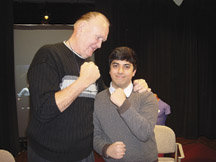When Sal Iannaci, video journalism/TV production teacher at Bayonne High School, asked his TV production students who they wanted to interview, he got a delightful shock.
He had expected them to suggest interviewing Bayonne Mayor Mark Smith or the congressman for the 13th District, Rep. Albio Sires, or some other political heavyweight; he did not expect them to suggest overwhelmingly Chuck Wepner, the Bayonne native who came within a hair’s breath of becoming heavyweight champion of the world.
Sometimes called “the real life Rocky Balboa,” Wepner is the six-foot, five-inch tall boxer who once boxed Muhammad Ali for 15 grueling rounds and managed to knock Ali to the canvas during a 1975 fight in Cleveland.
It was a fight witnessed on closed circuit TV in Philadelphia by Sylvester Stallone, who used it as inspiration for the 1976 film “Rocky.”
Wepner is a boxer with more than 140 amateur and professional fights.
While most famous for his fight with Ali, Wepner said his fight against Big George Foreman was one the toughest and one of the most controversial since judges stopped the fight in the third round due to Wepner’s bleeding. The judges awarded the fight to Foreman on a knockout.
He fought some of the legends of the boxing world, and even worked as the sparring partner for Smokin’ Joe Frazier.
Perhaps fate meant for the students to interview Wepner, since Iannaci had Wepner’s daughter, Kim, in a class he taught at New Jersey City University.
Iannaci said she became instrumental in arranging the interview, although foul winter weather and scheduling problems got in the way a few times before the event could occur.
This only gave Iannaci’s students at Bayonne High School more time to prepare, and prepare they did, rehearsing for the interview as if for the president of the United States.
Yama Almas, who was not nearly as tall as Wepner, sat in during these rehearsals, using his research on the legendary Bayonne boxer to field questions other students were expected to ask during the actual event.
Sometimes, Almas chuckled through his answers as if he didn’t believe his own role, but he knew his information, using previous interviews to best guess what Wepner might offer as a reply while the TV crew gained experience in managing sound and cameras.
“It was great to have a real celebrity in our studio,” Almas said.
Kaitlin Toolin, a five-foot tall student who literally had to look up at Wepner, said, “He really is larger than life.”
Drew Wodzanowski said, “Chuck is the kind of guy you can hang out with.”
Growing up in Bayonne was tough
Born in 1939, Wepner claimed in a 2007 interview with the Bayonne Community News that he learned to fight on the streets of Bayonne.
“This was a tough town with a lot of people from the docks and the naval base, and you had to fight to survive,” he said.
Wepner was about a year old when he moved in with his grandmother on 28th Street near Kennedy Boulevard (Hudson Avenue then). He was raised by his mother and grandparents.
“We lived in a room that was a converted coal shed until I was 13,” he said.
But he was always into sports, he said.
“I played basketball for the Police Athletic League when I was very young,” he said.
Faced with a future on the waterfront as a longshoreman, Wepner joined the U.S. Marines, looking for other opportunities. There he learned to use his fists in a different way as a member of the boxing team. He eventually became a military champion at one of the airbases, and developed a reputation for being able to withstand other boxers’ punches.
A husband and father when he got out of service, he took up work as a security guard at Western Electric. He also worked as a bouncer at local clubs.
When a civilian again, people encouraged him to get involved with the Golden Gloves in Bayonne, and he eventually went into the New York Golden Gloves, where he won the heavyweight championship.
He turned professional in 1964 and became a popular fighter on the Northeast’s Club Boxing circuit. During the early years, he fought throughout the county, including arenas in North Bergen and Secaucus.
Some of his credits include All American Champion, National Golden Gloves Champion, New Jersey Champion, and North American and National American Champion. At one point, he was ranked as eighth of world heavyweight boxers.
He won his nickname, the “Bayonne Bleeder,” from a fight that was halted because of his excessive bleeding.
The students did most of the work
“Chuck was gracious enough to donate his time to the students,” Iannaci said, after the weather abated long enough to allow the interview to take place in early February. “It was a great experience for the students.”
The students developed the questions and the format of the interview, as well as the graphics and voiceover parts.
The minimalist set featured a set of boxing gloves hung on a rack behind Wepner, while behind the students – who took turns interviewing him – was a mannequin wearing a Chuck Wepner tee-shirt. Also running on a screen behind them were scenes of the Wepner/Ali fight.
The interview covers Wepner’s young life in Bayonne, his successes in the U.S. Marines, his Golden Gloves championship, his fights with Sonny Liston, Muhammad Ali, and other great fighters of his era, and his relationship with filmmaker Sylvester Stallone.
Iannaci said that Wepner was “affable and quite candid” throughout the interview with the students.
“Some of the funnier stories involve Andre the Giant and a bear that Chuck fought not once, but twice,” Iannaci said.
The result is a program called “Ten Rounds with Chuck Wepner,” scheduled to begin broadcasting on the Bayonne Educational Network on March 16 at 8 p.m., and shown on March 19 and 20 at the same time.
